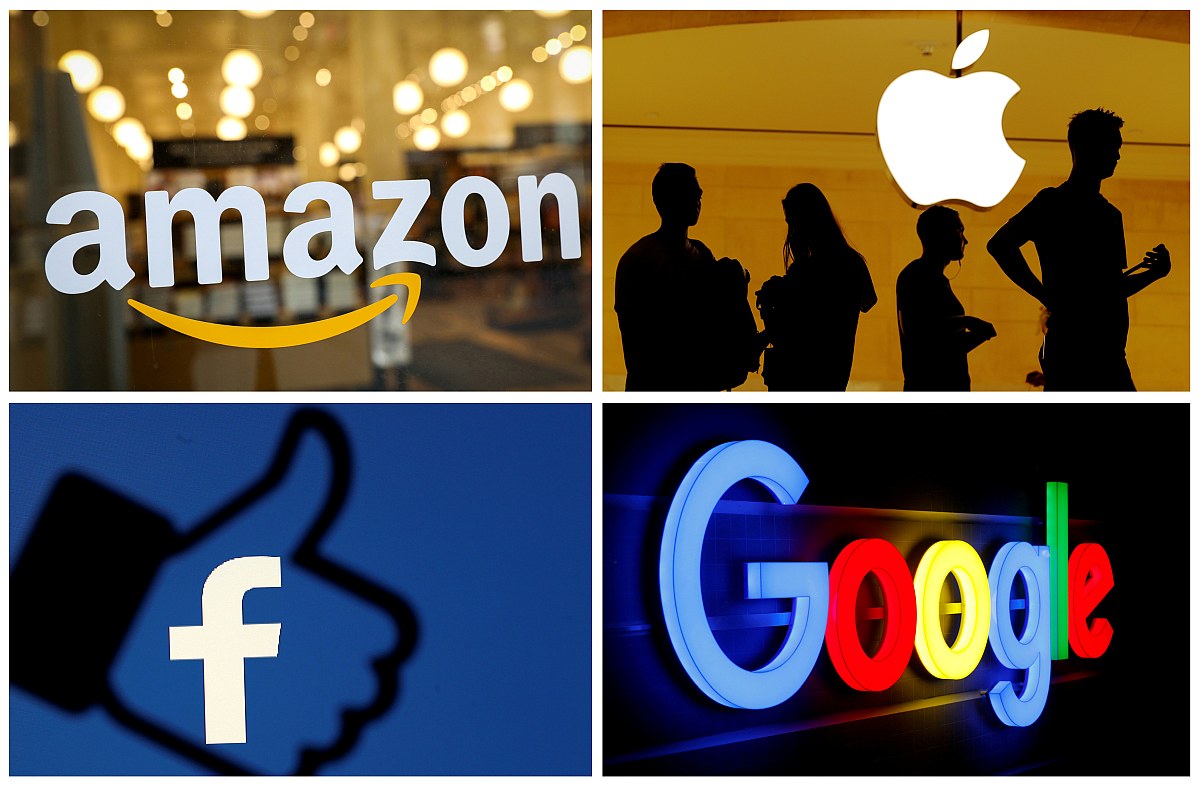Layoffs Alone Won’t Solve Tech’s Problems: Parmy Olson

The world’s largest tech companies are promising across the board to spend less, new territory for an industry that thrives on perks. Already last year, Facebook parent Meta Platforms shut down its laundry service for staff, and in January of this year, Alphabet’s Google included more than 30 massage therapists in its first big round of layoffs.
Tech giants are tightening up on fringe benefits and showing their talent the door. But there is still more to do.
Hiring freezes and cutting perks are the easy part. Now, having grown fat on old business models and morphed into sprawling bureaucracies, Silicon Valley’s biggest firms must become innovative again. That means spearheading a shift in culture away from protecting mini-fiefdoms and more toward getting ideas in motion and product features out the door. That’s an entirely new challenge for big tech’s stable, mostly technocrat leaders. Microsoft’s Satya Nadella, Meta’s Mark Zuckerberg, and Google parent Alphabet’s Sundar Pichai have overseen years of continued growth largely by keeping things ticking along.
When the pandemic came, their steady growth went into overdrive. Collective profits at Amazon, Apple, Facebook, Google, and Microsoft grew by 55 percent in 2021 from an already eye-popping baseline. Their combined $1.4 trillion (roughly Rs. 1,15,83,670 crore) in sales would have made them the world’s 13th largest economy, overtaking Australia.
Now with shares and growth under pressure, Zuckerberg is talking about flattening his leadership structure and trimming middle management. Pichai wants to “re-engineer the company’s cost base in a durable way.” That will mean more layoffs because even the latest, painful cuts haven’t brought staffing levels anywhere close to pre-pandemic levels.
Facebook hired about 30,000 new staffers during the pandemic while Alphabet went on an even bigger hiring spree, swelling its ranks by 68,000 to 187,000. But Meta and Google have announced 11,000 and 12,000 job cuts, respectively, so far. Microsoft, which hired 58,000 people in the two years following the start of the pandemic, said last month that it was cutting 10,000 positions. The painful truth is that for these companies to earn the market’s trust in their pledges for efficiency, cuts will need to continue through 2023.
They also will have to continue to get the most out of their top talent, who might be less inclined to stay loyal to their employers now that they know that their bosses could cut them loose at any time.
An equally difficult task will be changing tech’s management culture. Already last year, months before the layoffs began, Zuckerberg and Pichai were telling staff they needed to work harder, with “greater urgency,” in the words of the Alphabet chief executive, and to come to the office more frequently.
Google especially needs to get better at executing on new product features. For all the attention that the company receives about its exciting moonshot projects, Google is notoriously conservative in its release of new products and services, because it doesn’t want to tinker too much with its $150 billion (roughly Rs. 12,41,000 crore) search business or its lucrative ad-tech operation. But the search business has come under threat from ChatGPT and other AI tools that generate conversational answers to any query.
Under pressure to respond, Google on Monday said it would soon release a ChatGPT competitor called Bard to the public. The service will be powered by LaMDA, Google’s highly sophisticated large language model. Google has rarely moved so quickly to develop a product, marking a risky new era for the company while it’s simultaneously trying to cut back on spending.
Doing more with less is much harder than it sounds for companies in Silicon Valley, who are used to throwing money at problems to make them go away. At least they know that needs to change. Meta Chief Technology Officer Andrew “Boz” Bosworth said in an email to the company’s 18,000 Reality Labs employees, who are driving its metaverse efforts, that “we have solved too many problems by adding headcount.” Now Meta needs to learn to solve problems by innovating and executing.
Zuckerberg used the word “efficient” or “efficiency” approximately 40 times in his earnings call with analysts last week. (By comparison, he mentioned “metaverse” just seven times.) Investors liked that direction of travel so much that they sent Meta’s shares up by more than 20 percent after earnings day, despite a miss on profit estimates.
A looming question is how much all this talk of efficiency from Alphabet, Meta, and Microsoft, the world’s biggest internet and software companies, will lead to real improvements. And if it doesn’t, will investors care? Meta’s rally last week could be a sign that investors are looking for any excuse to resume their love affair with some of the most profitable companies in history. Who wants to agitate for efficiencies from companies (barring Amazon) that have regular quarterly net margins of around 30 percent? Compare that with two other popular stocks, Walmart, and Walt Disney, that have margins of 6 percent and 5 percent, respectively, according to Bloomberg data.
Still, high margins weren’t enough to stop big tech stocks from getting bruised over the last year in the markets. Wall Street wants to see these companies become leaner and meaner. Big Tech’s investor-friendly, technocratic operators will almost certainly comply.
© 2023 Bloomberg LP
Facebook Faces Yet Another Outage: Platform Encounters Technical Issues Again

Uppdated: It seems that today’s issues with Facebook haven’t affected as many users as the last time. A smaller group of people appears to be impacted this time around, which is a relief compared to the larger incident before. Nevertheless, it’s still frustrating for those affected, and hopefully, the issues will be resolved soon by the Facebook team.
Facebook had another problem today (March 20, 2024). According to Downdetector, a website that shows when other websites are not working, many people had trouble using Facebook.
This isn’t the first time Facebook has had issues. Just a little while ago, there was another problem that stopped people from using the site. Today, when people tried to use Facebook, it didn’t work like it should. People couldn’t see their friends’ posts, and sometimes the website wouldn’t even load.
Downdetector, which watches out for problems on websites, showed that lots of people were having trouble with Facebook. People from all over the world said they couldn’t use the site, and they were not happy about it.
When websites like Facebook have problems, it affects a lot of people. It’s not just about not being able to see posts or chat with friends. It can also impact businesses that use Facebook to reach customers.
Since Facebook owns Messenger and Instagram, the problems with Facebook also meant that people had trouble using these apps. It made the situation even more frustrating for many users, who rely on these apps to stay connected with others.
During this recent problem, one thing is obvious: the internet is always changing, and even big websites like Facebook can have problems. While people wait for Facebook to fix the issue, it shows us how easily things online can go wrong. It’s a good reminder that we should have backup plans for staying connected online, just in case something like this happens again.
Christian family goes in hiding after being cleared of blasphemy

LAHORE, Pakistan — A court in Pakistan granted bail to a Christian falsely charged with blasphemy, but he and his family have separated and gone into hiding amid threats to their lives, sources said.
Haroon Shahzad, 45, was released from Sargodha District Jail on Nov. 15, said his attorney, Aneeqa Maria. Shahzad was charged with blasphemy on June 30 after posting Bible verses on Facebook that infuriated Muslims, causing dozens of Christian families in Chak 49 Shumaali, near Sargodha in Punjab Province, to flee their homes.
Lahore High Court Judge Ali Baqir Najfi granted bail on Nov. 6, but the decision and his release on Nov. 15 were not made public until now due to security fears for his life, Maria said.
Shahzad told Morning Star News by telephone from an undisclosed location that the false accusation has changed his family’s lives forever.
“My family has been on the run from the time I was implicated in this false charge and arrested by the police under mob pressure,” Shahzad told Morning Star News. “My eldest daughter had just started her second year in college, but it’s been more than four months now that she hasn’t been able to return to her institution. My other children are also unable to resume their education as my family is compelled to change their location after 15-20 days as a security precaution.”
Though he was not tortured during incarceration, he said, the pain of being away from his family and thinking about their well-being and safety gave him countless sleepless nights.
“All of this is due to the fact that the complainant, Imran Ladhar, has widely shared my photo on social media and declared me liable for death for alleged blasphemy,” he said in a choked voice. “As soon as Ladhar heard about my bail, he and his accomplices started gathering people in the village and incited them against me and my family. He’s trying his best to ensure that we are never able to go back to the village.”
Shahzad has met with his family only once since his release on bail, and they are unable to return to their village in the foreseeable future, he said.
“We are not together,” he told Morning Star News. “They are living at a relative’s house while I’m taking refuge elsewhere. I don’t know when this agonizing situation will come to an end.”
The Christian said the complainant, said to be a member of Islamist extremist party Tehreek-e-Labbaik Pakistan and also allegedly connected with banned terrorist group Lashkar-e-Jhangvi, filed the charge because of a grudge. Shahzad said he and his family had obtained valuable government land and allotted it for construction of a church building, and Ladhar and others had filed multiple cases against the allotment and lost all of them after a four-year legal battle.
“Another probable reason for Ladhar’s jealousy could be that we were financially better off than most Christian families of the village,” he said. “I was running a successful paint business in Sargodha city, but that too has shut down due to this case.”
Regarding the social media post, Shahzad said he had no intention of hurting Muslim sentiments by sharing the biblical verse on his Facebook page.
“I posted the verse a week before Eid Al Adha [Feast of the Sacrifice] but I had no idea that it would be used to target me and my family,” he said. “In fact, when I came to know that Ladhar was provoking the villagers against me, I deleted the post and decided to meet the village elders to explain my position.”
The village elders were already influenced by Ladhar and refused to listen to him, Shahzad said.
“I was left with no option but to flee the village when I heard that Ladhar was amassing a mob to attack me,” he said.
Shahzad pleaded with government authorities for justice, saying he should not be punished for sharing a verse from the Bible that in no way constituted blasphemy.
Similar to other cases
Shahzad’s attorney, Maria, told Morning Star News that events in Shahzad’s case were similar to other blasphemy cases filed against Christians.
“Defective investigation, mala fide on the part of the police and complainant, violent protests against the accused persons and threats to them and their families, forcing their displacement from their ancestral areas, have become hallmarks of all blasphemy allegations in Pakistan,” said Maria, head of The Voice Society, a Christian paralegal organization.
She said that the case filed against Shahzad was gross violation of Section 196 of the Criminal Procedure Code (CrPC), which states that police cannot register a case under the Section 295-A blasphemy statute against a private citizen without the approval of the provincial government or federal agencies.
Maria added that Shahzad and his family have continued to suffer even though there was no evidence of blasphemy.
“The social stigma attached with a blasphemy accusation will likely have a long-lasting impact on their lives, whereas his accuser, Imran Ladhar, would not have to face any consequence of his false accusation,” she said.
The judge who granted bail noted that Shahzad was charged with blasphemy under Section 295-A, which is a non-cognizable offense, and Section 298, which is bailable. The judge also noted that police had not submitted the forensic report of Shahzad’s cell phone and said evidence was required to prove that the social media was blasphemous, according to Maria.
Bail was set at 100,000 Pakistani rupees (US $350) and two personal sureties, and the judge ordered police to further investigate, she said.
Shahzad, a paint contractor, on June 29 posted on his Facebook page 1 Cor. 10:18-21 regarding food sacrificed to idols, as Muslims were beginning the four-day festival of Eid al-Adha, which involves slaughtering an animal and sharing the meat.
A Muslim villager took a screenshot of the post, sent it to local social media groups and accused Shahzad of likening Muslims to pagans and disrespecting the Abrahamic tradition of animal sacrifice.
Though Shahzad made no comment in the post, inflammatory or otherwise, the situation became tense after Friday prayers when announcements were made from mosque loudspeakers telling people to gather for a protest, family sources previously told Morning Star News.
Fearing violence as mobs grew in the village, most Christian families fled their homes, leaving everything behind.
In a bid to restore order, the police registered a case against Shahzad under Sections 295-A and 298. Section 295-A relates to “deliberate and malicious acts intended to outrage religious feelings of any class by insulting its religion or religious beliefs” and is punishable with imprisonment of up to 10 years and fine, or both. Section 298 prescribes up to one year in prison and a fine, or both, for hurting religious sentiments.
Pakistan ranked seventh on Open Doors’ 2023 World Watch List of the most difficult places to be a Christian, up from eighth the previous year.
Morning Star News is the only independent news service focusing exclusively on the persecution of Christians. The nonprofit’s mission is to provide complete, reliable, even-handed news in order to empower those in the free world to help persecuted Christians, and to encourage persecuted Christians by informing them that they are not alone in their suffering.
Free Religious Freedom Updates
Join thousands of others to get the FREEDOM POST newsletter for free, sent twice a week from The Christian Post.
Individual + Team Stats: Hornets vs. Timberwolves
CHARLOTTE HORNETS MINNESOTA TIMBERWOLVES You can follow us for future coverage by liking us on Facebook & following us on X: Facebook – All Hornets X – …
Source link
-

 MARKETING7 days ago
MARKETING7 days agoRoundel Media Studio: What to Expect From Target’s New Self-Service Platform
-

 SEO6 days ago
SEO6 days agoGoogle Limits News Links In California Over Proposed ‘Link Tax’ Law
-
SEARCHENGINES6 days ago
Daily Search Forum Recap: April 12, 2024
-

 SEO5 days ago
SEO5 days ago10 Paid Search & PPC Planning Best Practices
-

 SEARCHENGINES5 days ago
SEARCHENGINES5 days agoGoogle Core Update Volatility, Helpful Content Update Gone, Dangerous Google Search Results & Google Ads Confusion
-

 MARKETING6 days ago
MARKETING6 days ago2 Ways to Take Back the Power in Your Business: Part 2
-

 MARKETING4 days ago
MARKETING4 days ago5 Psychological Tactics to Write Better Emails
-

 SEARCHENGINES4 days ago
SEARCHENGINES4 days agoWeekend Google Core Ranking Volatility















You must be logged in to post a comment Login